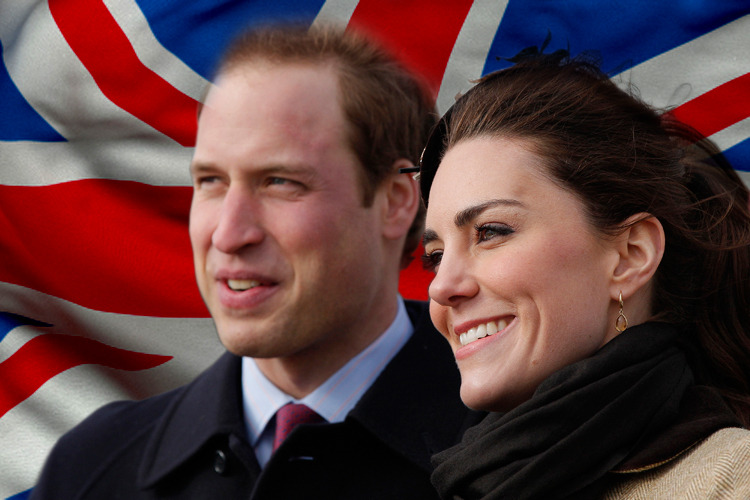Strolling through London’s busy shopping district last week, I saw something I’d never seen before: Giant British flags hanging from the buildings, in evenly spaced rows of five, as far as the eye could see. Actually, I’d seen a photo of the flags on the cover of the Evening Standard the night before, but the spectacle was stunning in person. In the spring breeze, the flags strained gently at their wires over the crowded thoroughfare. Here I was, just buying my afternoon sandwich, but my heart skipped a couple of beats.
In New York, such a spectacle would not be so unusual. But I have lived in the U.K. for the better part of three and a half years, and I cannot recall ever having seen such a naked display of British patriotism. Thanks to centuries in which the British empire waxed and waned (but mostly waned), Brits’ default attitude to their homeland is mostly one of self-conscious apology rather than confident exceptionalism. But with the international spotlight turned back on the country, and a wedding that is just as fun to complain about as it is to embrace, Britons seem to have rediscovered something they’d forgotten: national pride.
This comes, strangely enough, at a time when the outlook for most young people in Britain is not particularly bright. University tuition fees triple next year, while those just graduating face a bleak job market in which one in five will not find work. Cuts to arts, teaching, healthcare and other budgets have sparked violent protests in the past few months. And nearly everyone can claim some disappointment in the Conservative-Liberal Democrat coalition. In purely political terms, you wouldn’t think this was a moment for singing the praises of the mother country. Enter William Wales and Kate Middleton.
Here is the beauty of the “royal touch” in the U.K.: Even as they deal with political tensions and economic malaise, the Brits can also host a tremendous party – a colossal celebration of Britishness to which all people, whatever their political allegiance, are invited. On the surface, this Friday’s big event might be the wedding of two individuals, but in reality, it’s bigger than that – it’s a welcome and rare occasion for Brits to indulge in their own uniqueness. As Graham Norton wrote in the Sunday Times this weekend, in an open letter to William and Kate: “This isn’t just your special day – it’s ours, and we want it to be as lavish and regal as you can make it.”
Americans have no experience separating power from politics. All our towering public figures are linked with a party or political philosophy, and when a president addresses the nation, he will naturally appeal to some voters and frustrate others. The British have polarizing political figures, too. But beyond that, they have a transcendent figurehead, familiar to all and objectionable to relatively few. (Elizabeth II has ruled for so long that even the sternest republicans must find it difficult to hate her personally, whatever their negative feelings about the institution of the monarchy.) The importance of this keystone of the British government should not be underestimated.
In the run-up to Friday’s celebrations, Americans continue to ask why they should care about the wedding of a foreign prince and his fiancée. “Are the royals relevant?” is a common question. Of course they are.
In fact, there’s a strong case that the royals are more relevant today than ever. To my mind, the monarchy has reached its ideal incarnation – with all the pomp and spectacle of a bygone era but none of the actual power. Unable to dictate laws or make pronouncements over their subjects, the royals are almost totally benign, and they stand for all Britons in a way that party politicians simply can’t. They are “common,” in the truest sense of that word: shared by all. Everyone has an equal opportunity to claim or to disown them; even those who prefer parodying them to paying homage are well within their rights. Though money is tight, hundreds of thousands of people will descend on London this Friday, some sleeping outside all night to secure a place along the processional route, just to celebrate –with genuine excitement – the marriage of two people they have never met. That, in itself, may be the best argument against irrelevance that there is.
Middle East revolutions and the effects of last month’s devastating tsunami in Japan are doubtless worthier of our attention than speculation over Kate Middleton’s dress, but occasionally it is therapeutic to indulge in something beautiful and frivolous. And in a flagging economy, festive TV ads, red-and-blue bunting inside pubs and cafes, and wedding-themed displays in High Street shops are good for morale as well as business. (Not to mention that Brits are getting two four-day weekends back-to-back. It’s like the whole nation is on an extended vacation.)
I’ll admit William and Kate are not the most thrilling royal couple ever to lock lips at the altar, but to say this wedding is boring on that count is missing the point. This isn’t a wedding about two rich, attractive people. This is a wedding about early 21st-century Britons. It is, in fact, a perfect fulfillment of the royal family’s primary duty to the people. At a time when political and financial woes tend to hijack the national discourse, and austerity looms on the horizon, the royal family has given the British people morale-boosting entertainment, a turbo-charged pop culture phenomenon that can excite or infuriate — but is common to all.

